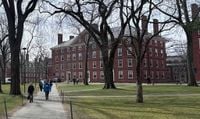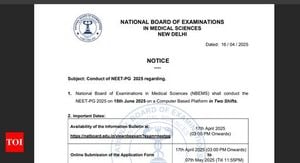BOSTON (AP) — Harvard University announced on Monday, April 14, 2025, that it will not comply with demands from the Trump administration regarding antisemitism, a decision that could jeopardize nearly $9 billion in funding. This announcement comes after a letter from the administration, sent on April 11, 2025, which outlined a series of broad reforms that included implementing merit-based admissions and hiring policies, conducting an audit of diversity views among students and faculty, and enforcing a ban on face masks, which appeared to target pro-Palestinian protesters.
Harvard President Alan Garber responded to the administration's demands in a letter to the Harvard community, asserting that these requirements violate the university’s First Amendment rights and exceed the government’s authority under Title VI, which prohibits discrimination based on race, color, or national origin. "No government — regardless of which party is in power — should dictate what private universities can teach, whom they can admit and hire, and which areas of study and inquiry they can pursue," Garber wrote. He emphasized that the university has already implemented extensive reforms to address antisemitism.
The Trump administration's demands are part of a broader effort to use taxpayer dollars to pressure major academic institutions into compliance with its political agenda. The administration has also paused federal funding for other Ivy League schools, including the University of Pennsylvania, Brown, and Princeton, to enforce its directives. Harvard's situation is particularly notable as it marks the seventh time the Trump administration has withheld funding from an elite college, with six of those being Ivy League institutions.
In response to the administration's demands, a group of Harvard alumni wrote to university leaders urging them to legally contest and refuse to comply with what they described as unlawful demands that threaten academic freedom and university self-governance. Anurima Bhargava, one of the alumni behind the letter, stated, "Harvard stood up today for the integrity, values, and freedoms that serve as the foundation of higher education. Harvard reminded the world that learning, innovation, and transformative growth will not yield to bullying and authoritarian whims."
The pressure from the Trump administration has also sparked protests on campus over the weekend of April 12-13, 2025. Members of the Harvard community, along with residents of Cambridge, gathered to voice their opposition to the government's demands. Additionally, the American Association of University Professors filed a lawsuit on April 11, 2025, challenging the funding cuts. The lawsuit claims that the Trump administration has failed to follow the necessary steps under Title VI before initiating fund cuts, including providing notice to both the university and Congress.
In their legal challenge, the plaintiffs argued that the demands imposed by the Trump administration are not targeted remedies addressing any specific determination of noncompliance with federal law. Instead, they assert that these demands seek to impose political views and policy preferences advanced by the administration and compel the university to punish disfavored speech.
The implications of the funding freeze are significant, as Harvard is one of the nation’s top research universities, particularly in fields such as science and medicine. Garber warned that withholding federal funding not only risks the health and well-being of millions but also threatens the economic security and vitality of the nation. He reiterated that the government’s actions violate the university's constitutional rights and exceed its authority.
The Trump administration has argued that universities have allowed antisemitism to go unchecked, particularly during campus protests last year against Israel's actions in Gaza. However, Harvard has maintained that it has taken substantial measures to address antisemitism on its campus.
In a statement from the federal antisemitism task force on April 14, 2025, officials claimed that Harvard’s defiance reinforces a troubling entitlement mindset prevalent in the nation’s most prestigious universities. They stated, "The disruption of learning that has plagued campuses in recent years is unacceptable. The harassment of Jewish students is intolerable."
As the standoff between Harvard and the Trump administration continues, the outcome remains uncertain. The university stands firm in its commitment to academic freedom and its independence from governmental control, while the administration appears resolute in its efforts to impose its agenda on higher education institutions.
This situation underscores a growing tension between academic institutions and government authorities, as universities grapple with maintaining their autonomy while navigating political pressures that threaten their funding and operational independence. The developments at Harvard could set a significant precedent for how academic institutions interact with federal funding and governmental demands in the future.








